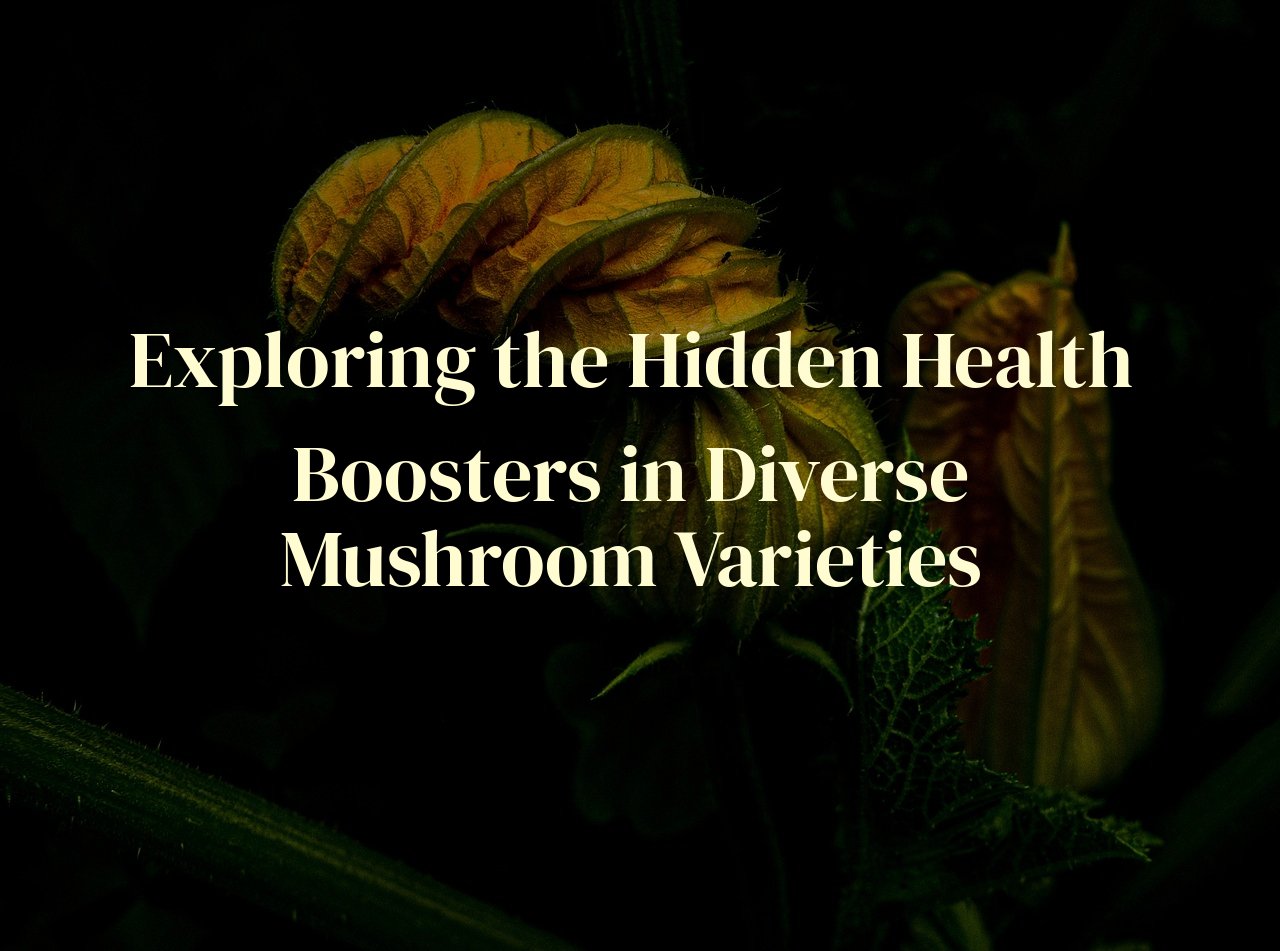
Mushrooms are not only culinary delights but also packed with unique health properties. This post explores a variety of mushrooms and the distinctive health benefits each type offers, making it a must-read for health enthusiasts and food lovers alike.
By reading this post, you’ll gain insight into how different mushroom varieties can aid in boosting your immune system, improving your gut health, and even enhancing your mental clarity. Whether you’re a seasoned cook or just someone looking to improve their diet, the information in this post will provide valuable knowledge you can use every day.
Table of Contents
Shiitake Mushrooms: Immune System Champions
Shiitake mushrooms have long been revered not just for their robust, earthy flavor but also for their potent health benefits, particularly in fortifying the immune system. It’s amazing how these modest fungi pack such a powerful punch!
The star component in shiitake mushrooms is a polysaccharide called lentinan. Lentinan has been shown to bolster the immune system by stimulating the production of white blood cells, which are essential for warding off infections. If you’ve ever had a cold that just wouldn’t go away, you might appreciate how valuable this can be.
But lentinan isn’t the only immune-boosting compound here. Shiitake also contains beta-glucans, another type of polysaccharide that enhances the body’s ability to fend off pathogens. Beta-glucans are like the secret agents of the mushroom world, working behind the scenes to keep you healthy.
I remember the first time I started incorporating shiitake mushrooms into my diet. It was during a particularly grueling flu season. I sautéed them with some garlic and tossed them in my morning omelette. Not only did my omelette taste fantastic, but I genuinely felt more resilient against the seasonal bugs making the rounds.
Another noteworthy compound is eritadenine, which helps to lower cholesterol and improve cardiovascular health. Cardiovascular health and the immune system are intricately linked, as a strong heart leads to better overall health and an enhanced immune response.
Additionally, shiitake mushrooms are rich in selenium, zinc, and various B vitamins, all of which play pivotal roles in maintaining a robust immune system. Selenium, for instance, helps reduce oxidative stress, while zinc is involved in DNA synthesis and immune cell production.
What always leaves me in awe is the age-old wisdom embedded in traditional Chinese medicine, where shiitake mushrooms have been used for centuries to promote longevity and vitality. It’s fascinating how modern science is now catching up, validating these age-old practices with rigorous research.
If you’re someone who enjoys a bit of culinary adventure like I do, experimenting with shiitake mushrooms can be a delightful way to boost your immune system. Try them in soups, stir-fries, or even as a meat substitute in your favorite recipes. Their umami-rich flavor makes them incredibly versatile and enjoyable.
So, the next time you’re wandering through the produce aisle, don’t overlook these humble brown mushrooms. They’re not just food; they’re a gift for your immune system, offering both nourishment and resilience in every bite.
Reishi Mushrooms: Nature’s Stress Relievers
[‘
Reishi mushrooms, also known as Ganoderma lucidum or Lingzhi, have been revered for centuries in traditional Chinese medicine for their remarkable health benefits. One of the most compelling attributes of reishi mushrooms is their ability to act as natural stress relievers. But what is it that makes these fungi so effective in combating stress? Let me share a personal experience that highlights the magic of reishi mushrooms.
‘, ‘
The first time I tried reishi mushroom tea, I was skeptical. I had been going through a particularly stressful period at work, juggling multiple deadlines and barely managing to keep my head above water. A friend suggested I try reishi, and I figured, why not? To my surprise, after a week of sipping reishi tea each evening, I began to notice a subtle yet profound change. My sleep quality improved, my mind felt clearer, and, most importantly, my anxiety levels dropped significantly.
‘, “
One of the key components responsible for these stress-relieving properties is the presence of triterpenes. These compounds have been shown to have a calming effect on the nervous system. Triterpenes help modulate stress hormones, particularly cortisol, which is often referred to as the ‘stress hormone’. By balancing cortisol levels, reishi mushrooms help alleviate the physiological symptoms of stress.
“, ‘
Additionally, reishi mushrooms contain polysaccharides, which are known for their immune-boosting and anti-inflammatory properties. Chronic stress can weaken the immune system, making the body more susceptible to illnesses. The polysaccharides in reishi mushrooms support the immune system, offering an added layer of protection against the detrimental effects of stress.
‘, ‘
From a scientific standpoint, reishi mushrooms are adaptogens, which means they help the body adapt to stress by normalizing physiological functions. This adaptogenic quality is why reishi mushrooms are so effective in promoting relaxation and mental clarity. Adaptogens not only help manage stress but also enhance overall well-being by maintaining homeostasis in the body.
‘, ‘
Another fascinating aspect of reishi mushrooms is their potential to improve sleep quality. Insomnia and poor sleep are common issues faced by those under chronic stress. Reishi mushrooms have been shown to enhance the duration and quality of sleep, thanks to their natural sedative properties. Improved sleep invariably leads to better stress management, creating a virtuous cycle of wellness.
‘, ‘
In my own journey with reishi, I discovered that incorporating these mushrooms into my daily routine was more than just a temporary fix. It became a lifestyle choice that continues to yield benefits. Whether consumed as tea, in capsule form, or added to smoothies, reishi mushrooms have earned a permanent spot in my wellness arsenal.
‘, “
For anyone seeking a natural way to combat stress, reishi mushrooms offer a holistic approach that addresses both the mind and body. Their unique combination of triterpenes, polysaccharides, and adaptogenic properties makes them unparalleled in the realm of natural stress relief. So next time you find yourself overwhelmed with life’s demands, consider reaching for the wisdom of reishi mushrooms. Your mind and body will thank you.
“]
Maitake Mushrooms: The Heart Helpers
Maitake mushrooms, also known as Grifola frondosa or ‘hen of the woods,’ have been savored for centuries in both culinary and medicinal traditions. This isn’t just because of their rich, earthy flavor, but also because of their remarkable heart health benefits. As someone who’s keen on exploring how nature can bolster our well-being, I’ve found Maitake mushrooms to be a true heart-helper in many ways.
One of the most celebrated attributes of Maitake mushrooms is their ability to manage blood pressure. These mushrooms are packed with potassium, a mineral known for its pivotal role in reducing the strain on blood vessels. This, in turn, helps to maintain a balanced blood pressure level, acting as a natural safeguard against hypertension. Personally, incorporating Maitake into my diet has been a delightful, flavorful approach to keeping my blood pressure in check, especially during stressful times.
Another heart-healthy benefit of Maitake mushrooms is their impact on cholesterol levels. They contain beta-glucan, a type of soluble fiber that has been shown to help lower LDL cholesterol, often referred to as ‘bad cholesterol.’ By helping to diminish the absorption of cholesterol in the intestines, Maitake mushrooms contribute to a healthier lipid profile. From my own experience, I’ve noticed that making them a regular part of my meals has had a noticeable effect on my overall cholesterol levels, making my doctor quite pleased.
Moreover, Maitake mushrooms are rich in antioxidants, particularly vitamin D and ergothioneine. These compounds play a crucial role in reducing oxidative stress, which is known to damage heart tissues and lead to cardiovascular diseases. Including these mushrooms in my diet has felt like an extra layer of protection against heart ailments, particularly given my family’s history of heart disease.
Perhaps what makes Maitake mushrooms stand out the most is how they support arterial health. They contain compounds that improve the elasticity of blood vessels, which is crucial for maintaining a smooth and efficient blood flow. This means less strain on the heart and a lower risk of atherosclerosis. Personally, after learning about this benefit, I started adding Maitake mushrooms to my soups and salads, knowing that each bite was contributing to the resilience of my cardiovascular system.
The synergy of these benefits makes Maitake mushrooms a powerful ally for heart health. It’s not just about their individual properties but how they work together to support a healthy heart. For anyone seeking natural ways to enhance their cardiovascular health, incorporating Maitake mushrooms into your diet is a savory, beneficial choice. In my own journey toward better heart health, these mushrooms have been an incredible discovery, combining wellness and taste in the most wholesome way possible.
Chanterelle Mushrooms: Vitamin Powerhouses
Chanterelle mushrooms are a dazzling golden treat from nature, renowned not just for their culinary versatility but also for their nutritional wealth. As an avid mushroom forager, I’ve often ventured into the forest, basket in hand, in search of these vibrant gems. To my delight, chanterelles are more than just a gourmet’s indulgence; they are brimming with essential vitamins that contribute to our overall well-being.
One of the standout vitamins in chanterelle mushrooms is Vitamin D. Often dubbed the ‘sunshine vitamin’, Vitamin D plays a crucial role in supporting our immune system and promoting bone health. Living in a place where sunshine can be scarce, especially in the colder months, I appreciate that adding chanterelles to my diet helps bridge the gap in my Vitamin D intake. Freshly sautéed chanterelles on toast has become a Sunday morning favorite!
Chanterelles are also a remarkable source of Vitamin C. This potent antioxidant aids in repairing body tissues, boosting immune function, and enhancing iron absorption. I vividly remember making a hearty chanterelle stew one rainy afternoon, and the comforting warmth of the dish was a reminder of all the health benefits packed within those golden clusters.
Moreover, chanterelles are rich in B-vitamins, particularly B6 and B12. These vitamins are vital for energy production and maintaining healthy brain function. As someone who juggles multiple roles, from blogging to family commitments, I find that incorporating chanterelles into my meals provides a much-needed energy boost, keeping my mind sharp and my body energized. My go-to recipe? A luscious chanterelle mushroom risotto that always gets rave reviews at dinner parties.
The presence of Vitamin A in chanterelles further enhances their appeal. Vitamin A is crucial for maintaining good vision, skin health, and proper functioning of the heart, lungs, and kidneys. I’ve noticed a significant improvement in my night vision and skin texture since making chanterelles a staple in my diet. A simple chanterelle and spinach salad has become my quick fix for a vitamin-rich meal.
It’s intriguing how such a humble, wild mushroom can pack such a potent nutritional punch. Whether it’s the immunity-boosting Vitamin D, the tissue-repairing Vitamin C, the energy-enhancing B-vitamins, or the vision-supporting Vitamin A, chanterelle mushrooms truly live up to their title as vitamin powerhouses. Their versatility in the kitchen only adds to their allure, making them a beloved feature in my culinary adventures.
Portobello Mushrooms: Versatile Protein Sources
When I first stumbled upon Portobello mushrooms in my local farmer’s market, I was captivated by their meaty texture and rich, earthy aroma. Little did I know that these fungi held an incredible nutritional secret—an impressive protein content. As a dietary therapy expert, I’ve seen firsthand how Portobello mushrooms can revolutionize your protein intake, especially for those pursuing a plant-based lifestyle.
Imagine crafting a gourmet meal centered around a Portobello mushroom ‘steak’. Not only are these mushrooms meaty, but they also provide a substantial protein boost, rendering them an excellent substitute for animal protein. With approximately 5 grams of protein per cup, they help meet dietary requirements effortlessly. Whether you are grilling, baking, or stuffing them, their versatility in cuisine cannot be overstated.
Additionally, Portobellos are a powerhouse of essential amino acids. This is not merely a scientific fact but something I noticed while coaching a client who struggled with protein intake on a vegan diet. By incorporating Portobello mushrooms, she experienced improved muscle strength and overall vitality. This is because these mushrooms contain all nine essential amino acids that our bodies cannot synthesize independently.
Complementing their protein richness, Portobello mushrooms boast a remarkable nutritional profile. They are low in calories yet high in dietary fiber, making them a satiating option for weight management. My personal experience in cooking stuffed Portobellos filled with quinoa and veggies not only satisfied my taste buds but also provided a nutrient-dense meal that left me feeling full and nourished for hours.
Furthermore, they are an outstanding source of micronutrients like selenium, potassium, and phosphorus. I recall a particularly enlightening moment during a nutrition workshop where these nutrients were emphasized for their role in cellular function and bone health. It’s no wonder that regular consumption of Portobello mushrooms can contribute to an enhanced sense of well-being, particularly for those seeking to balance their dietary intake with nature’s offerings.
One more, albeit underrated, benefit of Portobello mushrooms is their utility in various culinary applications. From juicy burger patties to hearty mushroom stir-fries, their robust texture and umami flavor profile make them an excellent canvas for chefs. For someone who enjoys experimenting in the kitchen, like myself, the creativity that Portobello mushrooms inspire is endless.
In summary, the wonders of Portobello mushrooms extend far beyond their taste and texture. They are a versatile protein source that fits seamlessly into any diet. Whether you are a seasoned cook or a novice in the kitchen, incorporating Portobello mushrooms into your meals offers an easy and delicious way to support your health and well-being.
Conclusion
Diving into the diverse world of mushroom varieties reveals their incredible health properties. By incorporating these fungi into your diet, you can enjoy not just great flavors but also enhanced wellness and vitality.



